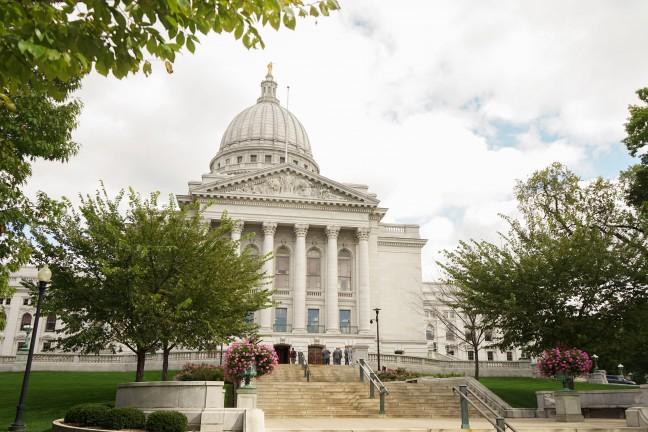The government, at every level, has many responsibilities — protecting citizens, representing constituents, fostering economic growth, supporting bipartisanship, etc. The list goes on. But the government’s most basic obligation is to make laws.
Laws play a role in our understanding of morality. They set the tone for what is ethical in our society. The power that comes with lawmaking is lofty and significant — it’s why we place such prestige and high standards on our lawmakers.
It’s been said that he who has the gold makes the rules. Flip the saying around: “He who makes the rules has the gold.” It works both ways. The power to decide what is right and what is wrong is more valuable than money. Such power can effect change, or uphold insensitive practices.
The line between the two sounds pretty thick. But the Wisconsin state Legislature has shown that the line between progress and the status quo can be easily reduced to an either/or decision.
Earlier this month, the office of state Rep. Lisa Subeck, D-Madison, released a statement regarding the 2019-20 legislative calendar. The calendar includes a possible session on the Jewish holiday of Yom Kippur, the holiest observance of the Jewish calendar. Subeck voted against the resolution to establish this calendar because of the conflict.
Sadly, this isn’t an unprecedented move. Last session, Republican legislative leaders included a session on Rosh Hashanah, the Jewish new year. Then, Subeck was allowed to speak before the vote to discourage her peers from voting in favor of the discriminatory calendar. This time, Subeck wasn’t allowed to speak until after the vote, which meant the Legislature would make the same mistake a second time.
Assembly Majority Leader Jim Steineke, R-Kaukauna, said though the schedule includes the week of Oct. 8-10, the Legislature only expects to hold session on the tenth. This is a nice sentiment — but nice isn’t good enough. There is still no guarantee session will not take place on Yom Kippur because it is on the calendar. If the Legislature did not plan on meeting during the holiday, there is no reason the calendar would look the way it does.
“Scheduling a possible session day on Yom Kippur, one of two Jewish high holidays, is akin to doing so on Christmas or Easter,” Subeck said. “There would never be a possible session day scheduled for these Christian holidays and the same should be true for major Jewish holidays.”
This should be true for not only Jewish celebrations, but for those of Muslim, Hindu and any other non-Christian faiths.
One could argue ignoring non-Christian holidays only inconveniences a few people. But Subeck’s absence means her entire constituency loses representation on important matters. Subeck should not have to choose between representing her constituents and observing a religious ceremony — to ask her to do so is a flagrant disregard for the separation of church and state. There is a fine line between shifting the status quo and relying on discriminatory practices. Unfortunately, the Legislature chooses to toe this line again and again.
Finally, we must consider the notion of power. The Legislature is arguably the most powerful political body in Wisconsin. Its actions, even ones as seemingly-minuscule as a legislative calendar, hold extreme weight and have the capacity to influence the opinions and treatment of several different groups. The deliberate disregard of Jewish festivals signals that Wisconsin’s most powerful body is not concerned about Jewish people in particular and those of non-Christian faiths in general.
In comparison to the recent Pittsburgh synagogue shooting, President Donald Trump’s Muslim travel ban or the vandalism near Madison’s Gates of Heaven synagogue in 2017, the legislative calendar incident seems less significant and less shameful. But dismissing this deliberate disregard for Wisconsin’s Jewish community is akin to normalizing discrimination. Tragic acts of hatred are only possible when we ignore smaller ones. A single brick does not constitute a building, but add several more and over time, there’s a wall to climb. Quit building the wall — let’s dismantle it.
Though the legislative calendar has been approved, the state Legislature still has time to rethink its treatment of Wisconsin’s Jewish community and non-Christian religious communities. There is always time to change, to do what is right. The only thing standing between our government and a more accepting Wisconsin is a simple step over a very thin line.
Abigail Steinberg (asteinberg@badgerherald.com) is a sophomore majoring in political science and journalism.


